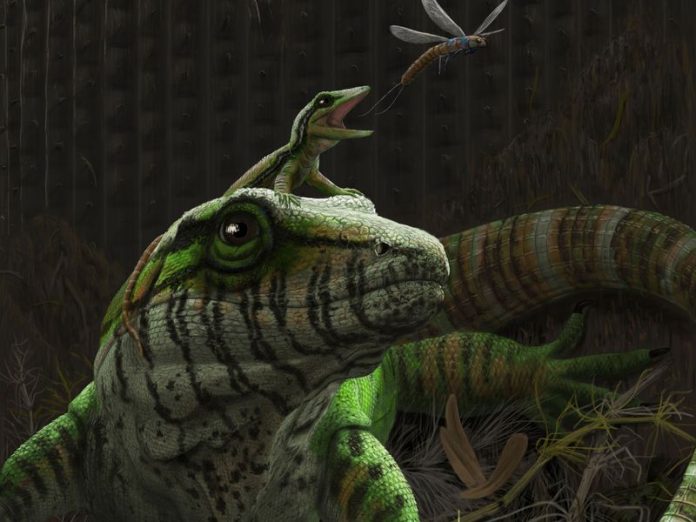A fossil of a primitive lizard with its tail wrapped around its young discovered in Canada is the first known example of parental care in the animal kingdom.
The fossil, which includes the remains of a juvenile positioned belly-up behind the mother’s hind limb, is around 309 million years old.
The finding suggests that ‘extended parental care’ – defined as parental care of offspring that continues on after birth – began around 40 million years earlier than previously thought.
“This is the earliest evidence of prolonged postnatal care in a vertebrate,” said Maddin, professor in the Department of Earth Sciences. “The adult animal appears to be concealing and protecting a juvenile in a den. This behavior is very common in mammals today. It is interesting to see this animal, which is on the evolutionary line leading to mammals, exhibiting this behaviour so early.”
Maddin’s team recently discovered the specimen of a varanopid synapsid inside a lithified tree stump on Cape Breton Island, Nova Scotia. The preserved articulated partial skeleton has a unique combination of features and represents a new species. The preserved remains are of a small individual close to a large individual of the same species in a position resembling a parent denning with an offspring.
The varanopid synapsid is lizard-like in appearance, but is nowhere near lizards in its evolutionary position. Once animals were able to lay eggs on land, they split into two distinct evolutionary branches, one that led to reptiles, birds and dinosaurs and the other, which included the varanopid synapsid, led to mammals.
Parental care is a behavioural strategy where parents make an investment or divert resources from themselves to increase the health and chances of survival for their offspring. While there are a variety of parental care strategies, prolonged postnatal care is amongst the most costly to a parent. This form of parental care is particularly common in mammals, as all mammalian offspring demand nourishment from their mothers. However, there is still little understanding of the evolutionary history of this behaviour.
Researchers have attempted to answer questions about the origin of parental care by studying fossils. Evidence of parenting has been generally limited to finding groups of preserved specimens of varying ages of the same species.















